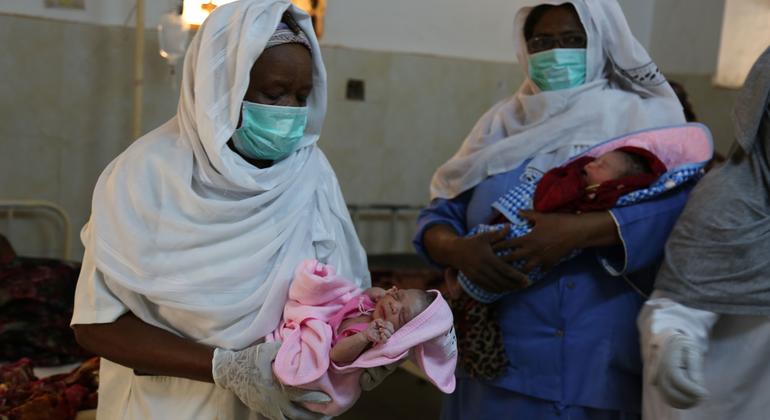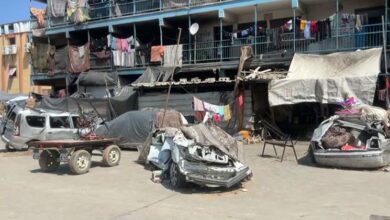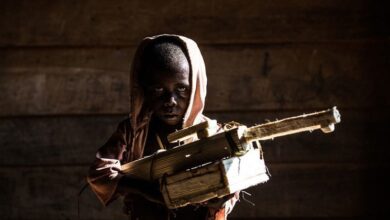Brave medical teams battle war conditions in Sudan to save newborn babies

Under artillery shells and gunfire, Esraa cradled her newborn son. When the war in Sudan broke out in April 2023, she tried to reach a health clinic to seek treatment for her child, who was struggling with infections and breathing difficulties. But with roads blocked by fighting, the young mother never reached the clinic; her son died in her arms.
When she became pregnant again last August, she was haunted by the fear of losing another child. “There is only one functioning maternity hospital left in Khartoum,” Esraa said. “It is very dangerous to travel around the city – one of our neighbors died on the way to the hospital.”
Throughout the war, Esraa and her family were forced to move several times as safe areas one day became deadly the next. They eventually found shelter in a crowded shelter with other displaced people from Khartoum.
‘It’s like moving from one grave to another’
Once Sudan’s largest city, Khartoum now has vast areas that resemble ghost towns. In the shelters set up to house those forced to flee their homes, living conditions are dire: Overcrowding is rampant and most basic sanitation is lacking. Food is also increasingly scarce, leaving many is fighting a raging hunger as Sudan is facing the most severe food insecurity ever recorded in the country.
As the crisis deepens and diseases like polio and cholera spreadAccess to health care has become one of the most significant challenges for the people of Khartoum. Most health facilities have been forced to cease operations due to destruction and severe shortages of supplies.
“I was five months pregnant when I came to the shelter,” Esraa said. “For me, it was like moving from one grave to another. We kept expecting something bad to happen. Hope had no place in our hearts.”

Midwives and other health professionals at Khartoum Maternity Hospital, Sudan.
Mobile Responder
In this dire situation, a mobile medical team supported by United Nations Population Fund has been going to the shelters to provide reproductive health and protection services to the women and girls living there. “Mobile health teams play a vital role in preventing maternal deaths, providing a comprehensive range of health services in war-affected areas in Sudan,” explained Mohamed Hasan Nahat, coordinator of the group.
Esraa received prenatal care and micronutrients from the group, who visited regularly to care for her and other women and girls at the shelter. “They not only provided me with medical care, but also gave me a sense of security and hope that I had not felt for months,” she said.
Four months later, Esraa gave birth to a healthy baby boy, assisted by the rescue team. “I gave birth at the shelter. They looked after me and the baby – I even named him Mohamed after the doctor who helped me.”
UNFPA has implemented 56 mobile medical teams across 11 states in Sudan, providing sexual and reproductive health, protection and response to gender-based violence services. Since the war began, the teams – which include doctors, pharmacists, laboratory technicians, psychologists and midwives – have provided more than 150,000 medical consultations.

Midwives and other health professionals at Khartoum Maternity Hospital, Sudan.
Although they are saving lives and providing the only medical support many receive, humanitarians like social worker Nisreen Kamal Abdulla feel they still want to do more for these communities.
“The time available at the clinic is not enough to treat everyone – we should visit every community more often to reach more people and provide consistent care,” she told UNFPA. “Most of the women we see with mental health problems stop treatment because they cannot afford the medication.”
Reaching remote communities
Mobility of groups is essential to increase access to essential services in remote areas, preventing maternal deaths from unsafe childbirth and high-risk pregnancies. Too often, lack of transport means many people cannot reach health centres in time – or not at all.
On average, a group will operate in three different locations each week, spending one to two days at each location, depending on the size and needs of the community.
“Although I did not leave Khartoum during the war and continued to work in hospitals here, this experience was different,” Dr. Nahat explained.
“I have been able to reach remote areas and connect with people I could not reach before. It is a huge morale booster for them to know that there are organizations that care about them and do not abandon them.”




